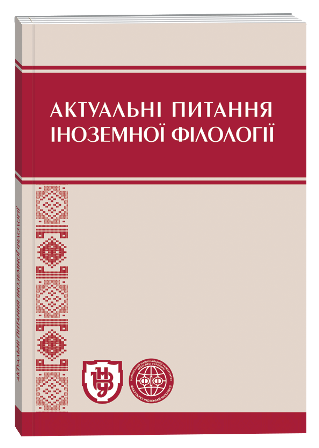THE NOMINATIVE LABELS FOR INDICATING THE NOTIONS OF “TEENS” AND “YOUTH” IN ENGLISH FICTIONAL DISCOURSE
Keywords:
the “person’s age” notion, the notion of “teens”, the notion of “youth”, lexical means of identifying a person's age, nuclear and peripheral units, English fictional discourseAbstract
The article deals with the formation of the body of the main nominative labels belonging to the notions of “teens” and “youth”, which are used for indicating the notions of “teens” and “youth” in English fictional discourse. Particular attention has been devoted to the definition of the notions of “teens” and “youth”, their structures and composition. The basic nuclear and peripheral units, which designate teenagers and young people, have been analyzed. A word-building analysis of the lexemes denoting the notions of “teens” and “youth” has been carried out. Attention has been devoted to the fact that, despite the broad study of the “person’s age” notion, the complex pragmatic study of nominative labels for indicating the notions of “teens” and “youth”, according to the lexical-semantic principle in English fictional discourse has not been done yet. The main researches on the problem of designating the notions of “teens” and “youth”, in English fictional discourse are described, and a detailed description of the authors’ works who examined the “person’s age” notion has been given. The relevance of the chosen theme determined by the general tendency of modern linguistic studies within the cognitive-discursive paradigm to objectively establish the body of nominative labels for indicating the notions of “teens” and “youth” in English. The research material, which was selected from the lexicographic sources, was also characterized, and discursive fragments, which refer to the age of the character, were selected from English books. It has been determined that the notion of “teens” is of a substantive nature, its center is the lexeme “teenager”, which denotes a person in one’s teens of both sexes, and the notion of “youth” has an adjective character, its center is the adjective “young”, which denotes a person of young age.
References
Авдеева О. А. Средства выражения концепта «возраст» в английском языке : дис. … канд. филол. наук : 10.02.04 / О. А. Авдеева. – Санкт-Петербург, 2007. – 220 с.
Жельвис В. И. Взаимоотношение слов и понятий adolescent (adolescence) и teener (teenager) в свете гипотезы лингвистической относительности. – В кн.: Вопросы социолингвистической языковой нормы. – Ярославль, 1981. –C. 20–27.
Костина Л. Т. Исследование группы прилагательных возраста в современном английском языке : дис. … канд. филол. наук : спец. 10.02.04 / Л. Т. Костина. – Москва, 1978. – 250 с.
Матвеев В. И. Структура семантического поля возраста человека (на материале русского, украинского и английского языков) : дис. … канд. филол. наук : спец. 10.02.19 / В. И. Матвеев. – Киев, 1984. – 276 с.
Панфилов В. З. Философские проблемы языкознания. – М. : Наука, 1977. – 287 с.
Хашимов Р. И. К вопросу о формировании русской возрастной лексики (историческое формирование и современное функционирование возрастных наименований несовершеннолетних детей) : дис. ... канд. филол. наук / Р. И. Хашимов. – М., 1973. – 200 с.
Bronté Ch. Jane Eyre. – M. : Foreign Publ, House, 1953. – 575 p.
Downloads
Published
How to Cite
Issue
Section
License
Copyright (c) 2025 Анастасія Пожар

This work is licensed under a Creative Commons Attribution 4.0 International License.







